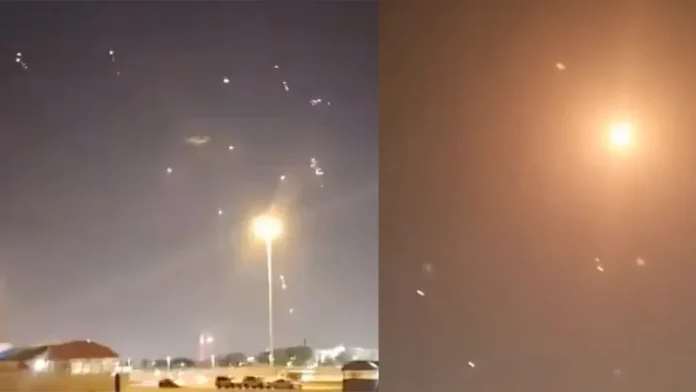Breaking: A Few moments ago, Iran’s armed forces launched a volley of short range and medium range ballistic missiles at the Al Udeid Air Base in Qatar, the largest U.S. military facility in the Middle East, in what Tehran called a measured response to recent U.S. air strikes on Iranian nuclear sites. Qatar’s defence ministry said air defences intercepted the volleys before they could hit runways or hangars, and no casualties or damage have been reported so far reuters.com.
The missile salvo followed Iran’s public warning that it would retaliate if the United States continued its campaign against Iran’s nuclear infrastructure. According to a senior U.S. official, Iran notified both Washington and Doha through diplomatic channels roughly three hours before the attack, allowing Qatar to close its airspace and ready its Patriot batteries reuters.com. Bahrain, another host to U.S. forces, also suspended flights as a precaution.
Qatari air defence units tracked and destroyed missiles in three separate waves, a statement from Doha’s foreign ministry said. Explosions and flare bursts could be seen over the capital, Doha, and videos shared on social media showed bright trails arcing across the night sky aljazeera.com. Local residents reported the sound of sirens and brief power cuts in some districts, but normal life resumed by early morning.
A U.S. defence spokesman confirmed the base took incoming fire but added that all personnel had been evacuated in recent days amid rising tensions in the region. He said no U.S. service members were hurt and that the facility’s key assets, including aerial refuelling tankers and drone operations, were relocated safely before the strike axios.com.
The strike is the latest twist in a spiralling cycle of hostilities. Over the past two weeks, Israeli jets bombed Iranian command centres and nuclear sites in central Iran, prompting Tehran to fire more than one hundred drones and missiles at targets in Israel. Iran has reported dozens of civilian casualties in its own cities, and Israel has acknowledged harm to a few border communities en.wikipedia.org
President Donald Trump, addressing the situation from the White House, warned that any further attacks on U.S. forces “will be met with force far greater than what was witnessed” during the weekend air strikes on Iran’s nuclear facilities. He emphasized that the United States will “protect its people and its interests across the region,” and he ordered additional assets to deploy to the Gulf axios.com.
Regional powers reacted with concern. Qatar, which hosts major American operations while maintaining ties to Iran, called for calm and urged all sides to return to talks. Kuwait and Oman offered to mediate, drawing on their history of quiet diplomacy. Meanwhile, United Nations Secretary General António Guterres appealed for restraint and warned that the conflict risked spiralling out of control.
Short Analysis
This missile attack underscores how fast a limited confrontation can flare into wider conflict. Iran chose a base in a friendly state with close U.S. ties, showing it sought a precise message but tried to avoid civilian harm. Qatar’s quick interception and U.S. advance warning suggest strong back-channel communication. Yet the risk now is that any misstep—an intercepted rocket that strays or a defensive system malfunction—could trigger a broader clash.

